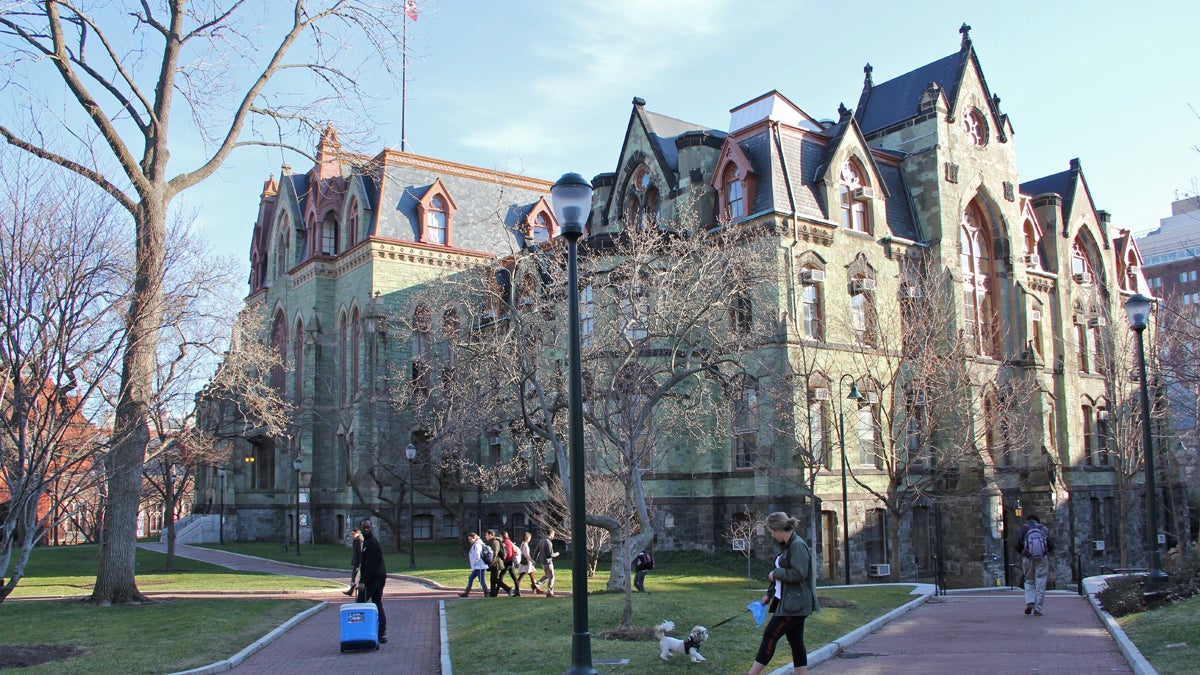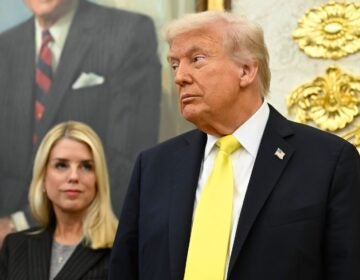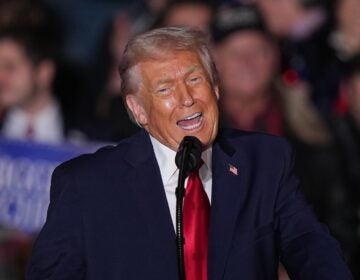Why Penn is morally obligated to disavow alum Donald Trump

College Hall on the University of Pennsylvania campus. (Emma Lee/WHYY
Editorial boards, governments, and former presidents, including two from Donald Trump’s own party, have rejected the candidate as preternaturally unfit and dangerous. The University of Pennsylvania, which Donald Trump attended for two years, has remained silent.
On Wednesday, the editors of the Atlantic Monthly broke with tradition and endorsed a presidential candidate, the Democrat Hillary Clinton, repudiating her Republican opponent, Donald J. Trump. The magazine had only done this twice before, to support Abraham Lincoln (1860) and to reject Barry Goldwater (1964). With basic American principles at stake, in all three cases the editors felt they had a moral obligation to act.
Mr. Trump, they noted, “traffics in conspiracy theories and racist invective; he is appallingly sexist; he is erratic, secretive, and xenophobic; he expresses admiration for authoritarian rulers, and evinces authoritarian tendencies himself.”
The Atlantic’s editors are hardly the only figures in American public life to take this provocative step. Editorial boards, governments, and former presidents, including two from Mr. Trump’s own party, have rejected him as preternaturally unfit and dangerous. In June, members of Philadelphia’s City Council passed a resolution condemning Trump’s candidacy. His beliefs, they declared, are “at odds with the deeply-held values of the City of Philadelphia.”
But one institution, the University of Pennsylvania, which Mr. Trump attended for two years, 1966-1968, and which graduated three of his children, has remained silent. Penn’s silence is particularly powerful because Mr. Trump often exploits his Penn affiliation, and particularly the Wharton School of Business, to grant himself legitimacy, and the color of intellect. “I have a very good brain,” he has said, and one clear reason for it, he would like the public to believe, is Penn.
This is a damning bit of anti-branding for one of the world’s top universities that ought to elicit a response, but far more than that, as a Penn alum, Kirsten Homberger, wrote, the institution’s protracted “silence is complicity.”
Homberger is one of 417 Penn alumni, students, faculty, and staff to sign a petition I initiated late last month calling on the University’s President Amy Gutmann and the Board of Trustees to “Disavow the intolerant views of alum Donald Trump.”
“Dr. Gutmann and Trustees,” wrote legacy alum Kristin Meyer, “your disavowal would knock some wind out of the sails of a demagogue. Please, for the sake of all that Penn stands for — hard work, critical thinking, open mindedness, regard for history, culture and inherited wisdom — please speak up at this crucial time.”
“People look to our school for guidance and look to our alumni as intellectual role models and leaders. We need to show people that we think voting for Trump will endanger the US and the rest of the world,” student Brian Hsia commented.
“Let’s speak up!” implored alum Juan Giusti Cordero.
But Penn officials have so far declined. Faculty have been instructed not to comment publicly on Mr. Trump’s candidacy (though many have signed the petition) and a University spokesman, Ron Ozio, told Inside Higher Ed, “The University doesn’t involve itself in partisan political races, so we would not have anything to offer on this.”
The passiveness of the statement is both cowardly and galling given what’s at stake for the nation and the world; Ozio has in mind stipulations of federal law that prohibit tax-exempt organizations from making political endorsements. But Penn is using the prohibition as a cloak for inaction, and inaction in the face of a demagogue, as Mr. Trump has proven to be, is tantamount to approval.
Penn can legally “offer” the nation a stance on its values in light of Mr. Trump’s; indeed the institution is morally and practically obligated to. The University’s Latin motto, Leges sine moribus vanae, “laws [or learning] without morals is in vain,” tells us so. Dr. Gutmann and the Board of Trustees can, and should therefore, announce something like:
The University of Pennsylvania does not endorse candidates for elected office. However, given that Donald J. Trump has attempted to use his association with and education at Penn to legitimize his discriminatory and intolerant positions, Penn is left with no choice but to publicly disavow them. To express anything short of condemnation would be tacit approval. His positions on issues regarding freedom of expression, gender and racial equality, and religious liberty do not derive from the education offered at Penn and do not reflect the values that Penn represents.
Beyond all this, Penn’s statement would reinforce the critical role of institutions of higher education in our society, as drivers of inquiry in the search of truth. That’s what Mr. Trump, who lies 91 percent of the time, threatens. The Atlantic’s editors put it succinctly: “He is an enemy of fact-based discourse.” Penn, the enemy is in plain sight. Are you going to act?
—
Nathaniel Popkin is co-editor of the Hidden City Daily and senior writer of the film documentary “Philadelphia: The Great Experiment.”
WHYY is your source for fact-based, in-depth journalism and information. As a nonprofit organization, we rely on financial support from readers like you. Please give today.




